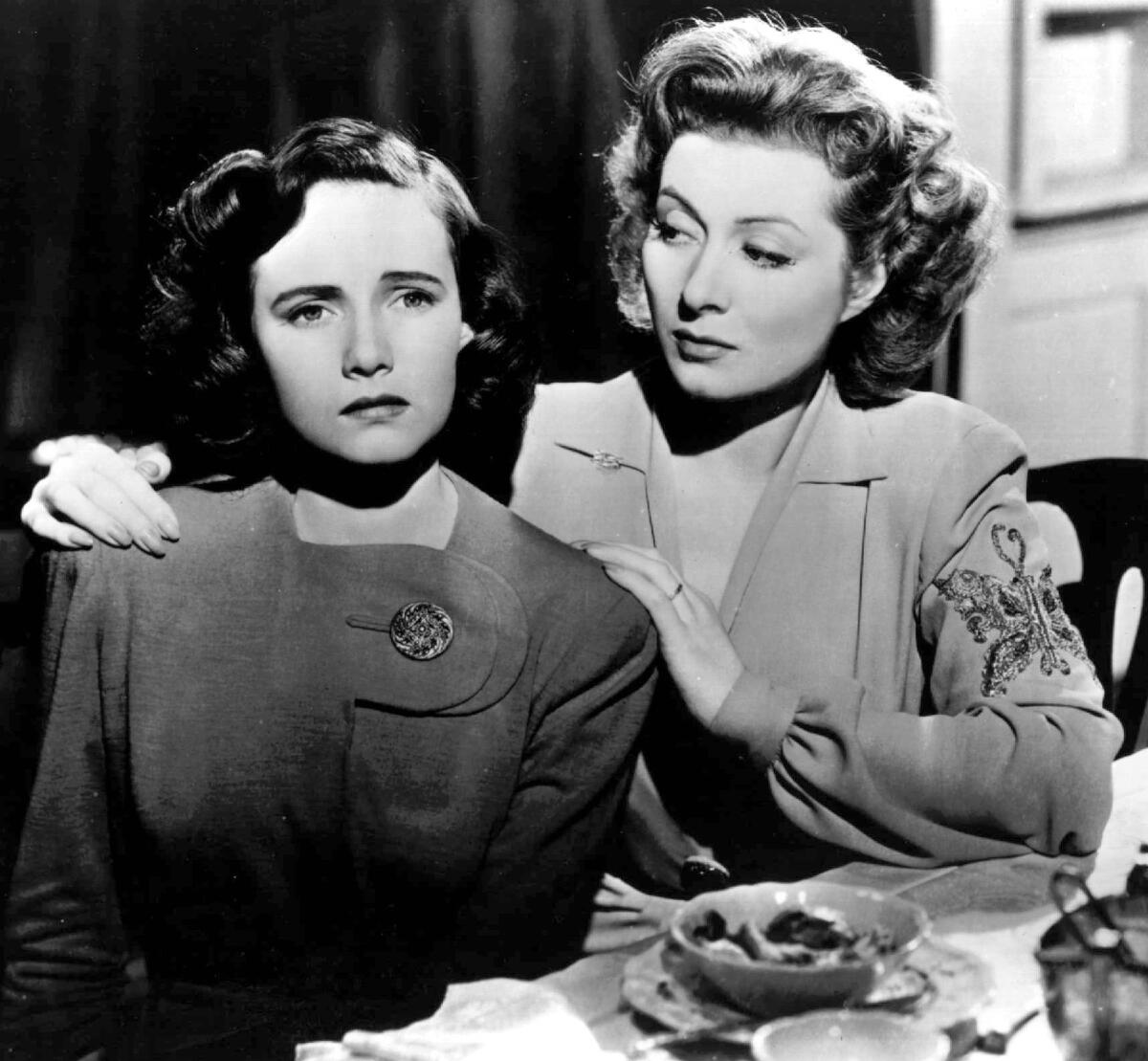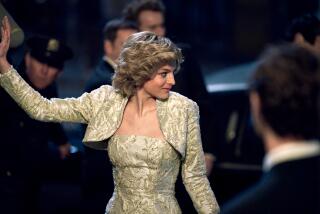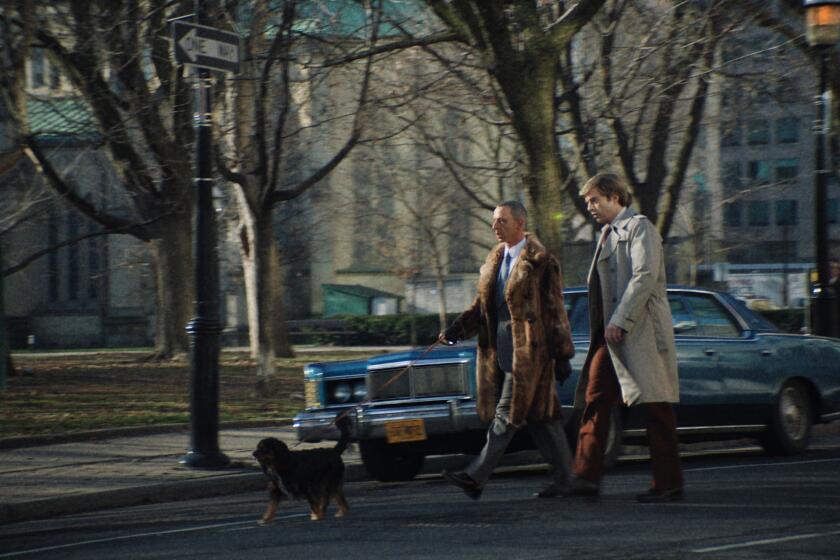From the Archives: ‘Miniver’ acclaimed as war revelation

What happens behind the lines in war? What is woman’s part in the war? These questions are vitally answered in “Mrs. Miniver,” which was given its premiere — one of the few gala affairs during these tempest-driven times — at Carthay Circle Theatre.
With the showing offered for charity objectives connected with war, the production had special import at its opening and it held one of the most representative first-night audiences seen in many a day spellbound throughout the screening.
APPROVAL GIVEN
Undoubtedly through their rapt silence, their frequent laughter in the earlier portion of the picture, their occasional bursts of applause and later their tears this public conferred its intense approval on the studio organization Metro-Goldwyn-Mayer, which sponsored “Mrs. Miniver,” as well as on the producer, Sidney Franklin, its director, William Wyler, and the cast headed by Greer Garson, Walter Pidgeon, Teresa Wright and Dame May Whitty.
All are bound to receive widespread recognition and the initial audience, made up to a large extent of motion-picture people and military, undoubtedly crystallized this probable great approbation to come. “Mrs. Miniver” does and will merit all the commendations it evokes, for it is indeed a distinguished accomplishment.
Truly this is a humanized account of an English family caught in the tornados of battle. It typifies the British spirit under the stress that has prevailed ever since the dread days of 1940. Particularly does it concentrate on happenings during the period of relentless raids by the Nazis, revealing their effect upon the men and women of a countryside so often described as peaceful, but anything but that when the attack of the enemy is in progress.
REAL TERROR
Pertinent indeed are those scenes which show what happens during a bombing. For here the real terror and impact of what happens is distilled into a visual reality through the simplest means.
Scarcely a single explosion do you witness with the eye, but you are conscious of the terrific destructive power of the blasts through their effect upon a small group of people huddled together in an air-raid shelter that rocks to the thunderous reverberations. Nothing could more tellingly reveal the horror of modern warfare, nor the courage that people can summon under its dread pressure, than this remarkable episode.
All of “Mrs. Miniver” is like that. Its power is through suggestion. Its drama is conveyed with that fascination which is inherent in a narrative told through indirection, rather than obviously.
The heroine of the picture’s title has a direct encounter with the war in a great series of scenes when she discovers an escaped German aviator on her property. In a sequence of great intensity he forces her to harbor him and supply him with food at the point of an automatic. Because he is wounded he eventually faints, and Mrs. Miniver has her opportunity to turn him over to the military, but it is a harrowing experience.
UNUSUAL SCENE
A great touch is contributed to these scenes when the husband, returned from taking part in the rescue at Dunkirk, says to her words to this effect: “And then I think of you here in peaceful England far away from the war.”
The wife says not a word; he learns what happened to her only through a chance remark of a servant.
Again and again does “Mrs. Miniver” deal in such deviously clever expedients in relating its deeply moving story. Tragedy, for instance, does not beset the family in the way that you think it will through the death of the boy, but through that of his spiritual young wife, who is killed during an air raid. Such are the peculiarities of fate during war.
Again — it is the villager who wins the prize for a rose at long last who is taken by death in his hour of triumph. The grand dame of the community has made a great sacrifice so that he may be successful. Hers is a splendid compensation, therefore, psychologically. She, too, is the one who endures a great blow in the death of her young granddaughter.
Such, indeed, are the ways of war. Nothing happens to the individual according to any set program, death seeks out his particular choice according to his unique plan. The higher justice is not always understandable, but all the more on that account does it bear deep analyzing.
IN THE HALL OF FAME
“Mrs. Miniver, “ therefore, is many things blended into an amazingly fine, sincere and meritorious picture — probably the most meritorious thus far to have been inspired through the present conflict. It takes its place with the great pictures. It expresses singularly, and without forcing this on you, the woman’s viewpoint. You see men in action briefly, and never in actual battle.
The film is a valuable contribution toward arousing the spirit of courage. It is undoubtedly one of the best in this respect for a public on the home front. It will find its plaudits among men as well as with women.
One could go on endlessly about the high worth of performances, extol the direction of William Wyler for its nuance and polish, the producing of Sidney Franklin. I recall only one scene that seemed out of key and that was when Mrs. Miniver emotionally held to her bosom the dying or dead Carol Beldon. It did not seem like Mrs. Miniver to grab to herself in that fashion a girl who had been wounded unto death. She was otherwise too intelligent to become that theatrical. This is practically the only flaw I find in an otherwise perfected production.
Of course, it is Greer Garson as the title character who triumphs. She, more than almost any other actress, is capable of investing a portrayal with befitting dignity, rare wholesomeness and well-judged feeling. She registers every reaction with astonishing power during the encounter with the Nazi soldier — an episode that is enormously demanding. You can well believe that she is actually going through the whole critical situation.
Actress Greer Garson, whose performance as the courageous English housewife “Mrs.
The lightness she conjures in the earlier portion of the film is also something to marvel at. It is a perfect exampling of the feminine viewpoint, and it is remarkable how she makes the transition, to the gallant woman under the strain of the war. Her eyes speak meanings fully when she realizes the danger to her son.
LOVELY TERESA
Teresa Wright is the acme of loveliness as she figures in the idealistic romance with Richard Ney. She is a rare sustaining influence in the picture, supremely sensitive and even, it might be said, angelic in the most acceptable sense of that word.
Dame May Whitty is perfectly chosen as a type for her delineation of the crusty dowager who dominates the village flower shows and who always insists on winning a prize for her roses. She has the vigor that goes with a strong lineage.
Of course, this has been overlooking one of the main forces in the film who is that through the splendid simplicity of his work — namely Walter Pidgeon, in the role of Clem Miniver. He is like a pillar to the structure of the plot in the strength of his personality.
Richard Ney is an ingratiating young man who plays the son who marries Miss Wright. Henry Wilcoxon has a big opportunity in speaking the epilogue, which makes for a potent message. He is the vicar. Henry Travers is well cast and able.
The comedy of the children enacted by Christopher Severn and Clare Sandars is a delight, the boy being particularly good. For a time they steal the film from everybody. Reginald Owen, as the senior air warden; Brenda Forbes and Helmut Dantine in his remarkable work as the futile fugitive German flyer are among various others to be warmly recognized.
The screenplay was skillfully written by Arthur Wimperis, George Froeschel, James Hilton and Claudine West. The book by Jan Struther suggested the production.
More to Read
Only good movies
Get the Indie Focus newsletter, Mark Olsen's weekly guide to the world of cinema.
You may occasionally receive promotional content from the Los Angeles Times.










